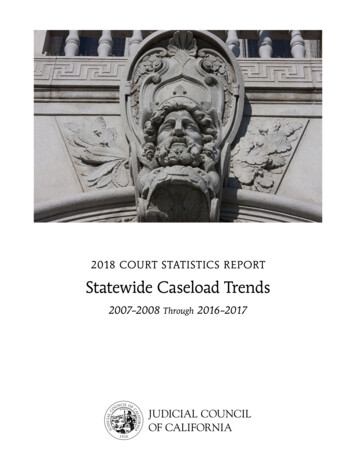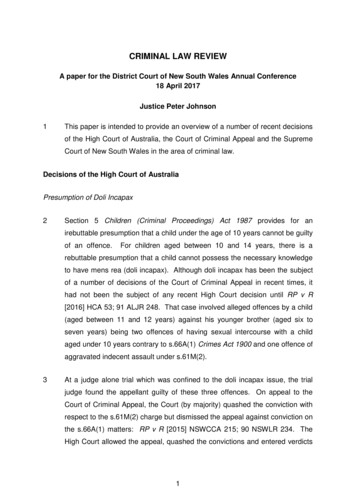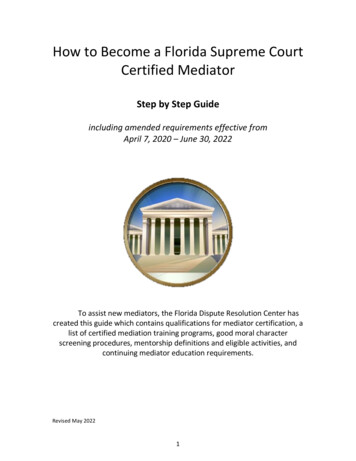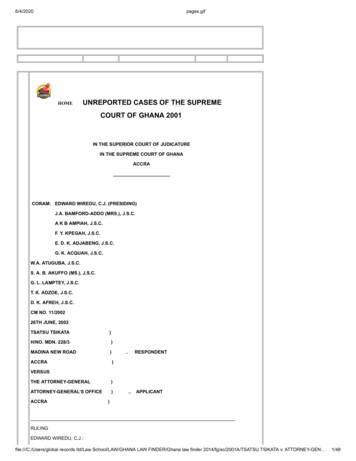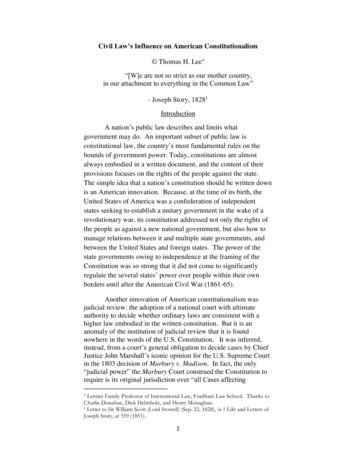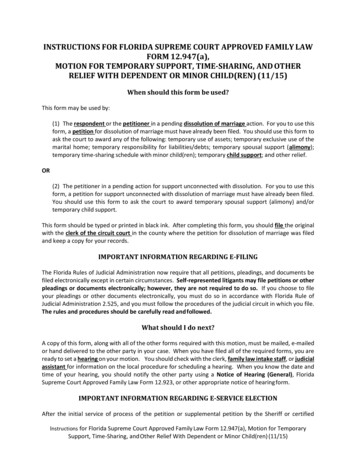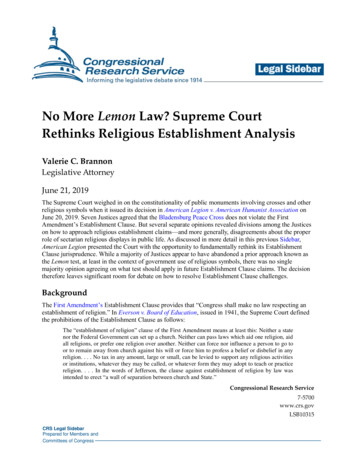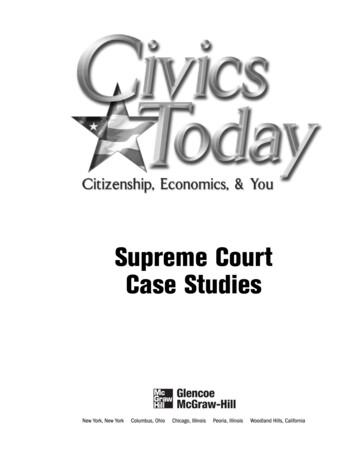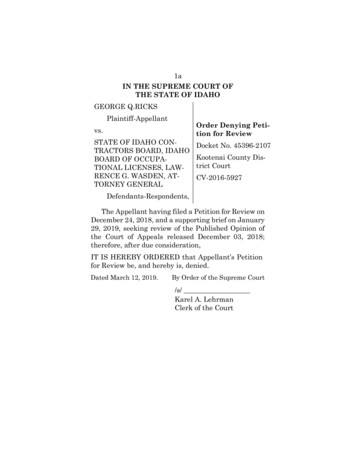
Transcription
1aIN THE SUPREME COURT OFTHE STATE OF IDAHOGEORGE Q.RICKSPlaintiff-AppellantOrder Denying Petition for Reviewvs.STATE OF IDAHO CONTRACTORS BOARD, IDAHOBOARD OF OCCUPATIONAL LICENSES, LAWRENCE G. WASDEN, ATTORNEY GENERALDocket No. 45396-2107Kootenai County District CourtCV-2016-5927Defendants-Respondents,The Appellant having filed a Petition for Review onDecember 24, 2018, and a supporting brief on January29, 2019, seeking review of the Published Opinion ofthe Court of Appeals released December 03, 2018;therefore, after due consideration,IT IS HEREBY ORDERED that Appellant’s Petitionfor Review be, and hereby is, denied.Dated March 12, 2019.By Order of the Supreme Court/s/Karel A. LehrmanClerk of the Court
2aIN THE COURT OF APPEALS OFTHE STATE OF IDAHODocket No. 45396GEORGE Q. RICKS,Plaintiff-Appellant,v.STATE OF IDAHOCONTRACTORS BOARD,IDAHO BOARD OFOCCUPATIONALLICENSES, LAWRENCEG. WASDEN, ATTORNEYGENERAL,Filed: December 3,2018Karel A. Lehrman,ClerkDefendants-Respondents.Appeal from the District Court of the First JudicialDistrict, State of Idaho, Kootenai County. Hon. Lansing L. Haynes, District Judge.Judgment, affirmed.George Q. Ricks, Rathdrum, pro se appellant.Hon. Lawrence G. Wasden, Attorney General; LeslieM. Hayes, Deputy Attorney General, Boise, for respondent.HUSKEY, JudgeGeorge Q. Ricks appeals from the district court’sjudgment dismissing his complaint. He argues the district court erred in dismissing his claims as a matterof law. The district court’s judgment is affirmed.I.
3aFACTUAL AND PROCEDURAL BACKGROUNDAs alleged in Ricks’ complaint, in 2014, Ricks filedan application for individual contractor registrationwith the Idaho Bureau of Occupational Licenses(IBOL). The application required Ricks to provide various pieces of information, including his social securitynumber. Ricks did not provide his social security number on his application because of his religious beliefthat social security numbers are “a form of the mark,and in substance (essence) the number of the 2-hornedbeast written of in the Holy Bible.” A few days afterRicks filed his application, IBOL requested his socialsecurity number in order to process his application. Instead of providing his social security number, Rickssent IBOL an affidavit describing his religious objection. A month later, Ricks received notice from IBOLthat his application for contractor registration was denied because he failed to provide his social securitynumber.It is not clear what actions Ricks took after his application was denied because the record on appeal doesnot contain any documents that detail the extent, ifany, of administrative review Ricks initiated after hisapplication was denied. However, Ricks’ complaintand appellate brief allege he filed a petition for review,received a “Certificate of Agency Record on Appeal,”and an attorney for the State of Idaho Contractor’sBoard (ICB) filed a motion to dismiss Ricks’ petition.None of these documents are included in the appellaterecord. Almost two years after this alleged administrative action, Ricks filed a complaint with the districtcourt listing ICB, IBOL, and Lawrence Wasden, theIdaho Attorney General, as defendants. Because Ricks
4afailed to sign the complaint, he filed an amended complaint with his signature. The amended complaintclaimed that 42 United States Code § 666(a)(13), IdahoCode § 73-122, and I.C. § 545210 violated: his right tocontract; his right to the free exercise of his religionunder the Idaho Constitution, Article 1, Section 4; hisstatutory religious freedom rights granted by the federal Religious Freedom Restoration Act (RFRA) andIdaho’s Free Exercise of Religion Protected Act(FERPA); his right to equal protection; a violation ofthe Privacy Act of 1974; and a violation of separationof powers. The complaint also contained a claim thatI.C. § 54-5210, the statute requiring contractors to provide their social security numbers on license applications is unconstitutionally vague and, therefore, isvoid.The State filed a motion to dismiss the amendedcomplaint under Idaho Rule of Civil Procedure12(b)(6), arguing that 42 U.S.C. § 666(a)(13), the federal statute that offers a grant to states that collectprofessional licensees’ social security numbers in orderto more effectively enforce child support orders,preempted Ricks’ religious objection under Idaho law.The district court granted the State’s motion1 and dismissed Ricks’ free exercise claim under the Idaho Constitution and his claim under FERPA.2 The State thenNeither a transcript of the hearing nor the order granting theState’s motion to dismiss are contained in the record.1It is unclear from the record whether the district court dismissed other claims from Ricks’ complaint during this hearing orin the district court’s related order, specifically Ricks’ right to contract, Privacy Act of 1974, separation of powers, Idaho Code § 545210 is void for vagueness, and equal protection claims. If theseclaims were not dismissed at this point in the proceedings, theywere likely dismissed in the district court’s third memorandum2
5afiled a second motion to dismiss3 arguing Ricks had nofundamental right to contract, his equal protectionwas not violated, the Privacy Act of 1974 was not violated, separation of powers was not violated, and thatI.C. § 545210 was not void for vagueness. Before thedistrict court ruled on the State’s second motion to dismiss, the district court permitted Ricks to file a secondamended complaint, which added a free exercise claimunder the First Amendment to the United States Constitution. The State then filed a third motion to dismiss arguing Ricks’ First Amendment rights were notviolated. At a hearing on the second and third motionsto dismiss, the district court asked the State to providebriefing on whether Ricks’ RFRA claim should also bedismissed. At the next hearing on the motions to dismiss, the district court declined to dismiss Ricks’RFRA claim. Almost a month later, the district courtissued a written order dismissing Ricks’ First Amendment claim. The State then filed a fourth motion todismiss Ricks’ RFRA claim, together with a motion forreconsideration. 4 Ricks appealed the district court’swritten order. After the district court granted theState’s motion for reconsideration,5 the district courtentered judgment and dismissed the remaining RFRAclaim.decision and order granting the defendants’ motion to reconsider,as shown below. In any event, the district court’s judgment definitively dismissed all Ricks’ claims by dismissing his entire complaint.3The State’s second motion to dismiss is not in the record.The State’s fourth motion to dismiss and motion for reconsideration is not in the record.4The order granting the State’s motion to reconsider the districtcourt’s written order is not in the record.5
6aII.STANDARD OF REVIEWAs an appellate court, we will affirm a trial court’sgrant of an I.R.C.P. 12(b)(6) motion where the recorddemonstrates that there are no genuine issues of material fact and the case can be decided as a matter oflaw. Coghlan v. Beta Theta Pi Fraternity, 133 Idaho388, 398, 987 P.2d 300, 310 (1999). When reviewing anorder of the district court dismissing a case pursuantto Rule 12(b)(6), the nonmoving party is entitled tohave all inferences from the record and pleadingsviewed in its favor, and only then may the question beasked whether a claim for relief has been stated. Coghlan, 133 Idaho at 398, 987 P.2d at 310. The issue is notwhether the plaintiff will ultimately prevail, butwhether the party is entitled to offer evidence to support the claims. Orthman v. Idaho Power Co., 126Idaho 960, 962, 895 P.2d 561, 563 (1995).The interpretation of a statute is an issue of lawover which we exercise free review. Aguilar v.Coonrod, 151 Idaho 642, 649-50, 262 P.3d 671, 678-79(2011). Such interpretation must begin with the literalwords of the statute; those words must be given theirplain, usual, and ordinary meaning; and the statutemust be construed as a whole. Verska v. Saint Alphonsus Reg’l Med. Ctr., 151 Idaho 889, 893, 265 P.3d 502,506 (2011). It is well established that where statutorylanguage is unambiguous, legislative history andother extrinsic evidence should not be consulted forthe purpose of altering the clearly expressed intent ofthe legislature. Id. Only where a statute is capable ofmore than one conflicting construction is it said to beambiguous and invoke the rules of statutory construction. L & W Supply Corp. v. Chartrand Family Trust,
7a136 Idaho 738, 743, 40 P.3d 96, 101 (2002). If it is necessary for this Court to interpret a statute because anambiguity exists, then this Court will attempt to ascertain legislative intent and, in construing the statute, may examine the language used, the reasonableness of the proposed interpretations, and the policy behind the statute. Kelso & Irwin, P.A. v. State Ins.Fund, 134 Idaho 130, 134, 997 P.2d 591, 595 (2000).Where the language of a statute is ambiguous, constructions that lead to absurd or unreasonably harshresults are disfavored. See Jasso v. Camas Cnty., 151Idaho 790, 798, 264 P.3d 897, 905 (2011).III.ANALYSISRicks argues the district court erred by grantingthe State’s motions to dismiss. Ricks argues the meritsof several of the claims made in his complaint, namely:(1) 42 U.S.C. § 666(a)(13), I.C. § 73-122, and I.C. § 545210 violate Ricks’ free exercise of religion as protected by FERPA, RFRA, and the United States andIdaho Constitutions; and (2) the statutes also violateRicks’ inalienable right to contract granted by theUnited States and Idaho Constitutions and amount toa violation of due process and an illegitimate exerciseof state and federal police power.6Before reaching these arguments, we address thematter of administrative exhaustion. Although nei-Although the State argues against perceived equal protectionviolations and unconstitutionality in its brief, likely becausethese arguments were raised below, the Court does not interpretRicks’ brief to contain such arguments. Thus, the Court does notaddress them here.6
8ather party raised the issue of administrative exhaustion on appeal, this Court may raise it sua sponte.“[T]he exhaustion doctrine implicates subject matterjurisdiction because a district court does not acquiresubject matter jurisdiction until all the administrativeremedies have been exhausted.” Fuchs v. State, Dep’tof Idaho State Police, Bureau of Alcohol Beverage Control, 152 Idaho 626, 629, 272 P.3d 1257, 1260 (2012)(quotations omitted).“As a general rule, a party must exhaust administrative remedies before resorting to the courts to challenge the validity of administrative acts.” LochsaFalls, L.L.C. v. State, 147 Idaho 232, 237, 207 P.3d963, 968 (2009) (quotations omitted). Parties are subject to the administrative remedies set out in the IdahoAdministrative Procedures Act (IDAPA) if “the issueat hand arose from a ‘contested case.’” Lochsa Falls,147 Idaho at 237, 207 P.3d at 968 (quoting I.C. § 675240). The Idaho Supreme Court has recognized twoexceptions to this exhaustion requirement: “(a) whenthe interests of justice so require, and (b) when theagency acted outside its authority.” Lochsa Falls, 147Idaho at 237, 207 P.3d at 968. Additionally, “failure toexhaust administrative remedies is not a bar to litigation when there are no remedies to exhaust.” Id. at239-40, 207 P.3d at 970-71. See also I.C. § 67-5271(2).The issues Ricks brings before this Court are subject to IDAPA’s administrative exhaustion requirement. Idaho Code § 54-5210(3) specifically notes that“an application for registration that has been deniedby the board shall be considered a contested case asprovided for in [IDAPA] and shall be subject to the provisions of [IDAPA] as well as the administrative rulesadopted by the board governing contested cases.”
9aThus, under IDAPA, Ricks was required to seek reliefthrough an administrative hearing. I.C. §§ 67-52405255. Only after receiving a final order from IBOL,does IDAPA permit Ricks to file a petition for judicialreview with the district court, which must be donewithin twenty-eight days of the issuance of the finalorder. I.C. §§ 67-5270-5279.Ricks does not argue that any of the exceptions tothis exhaustion requirement apply to his case, thus wedecline to consider any exceptions. It appears thatRicks sought some measure of administrative reviewof IBOL’s decision denying his contractor’s license application, although the record does not demonstratewhat, if any, administrative review occurred. Thus, itis unclear whether Ricks has shown that he exhaustedall administrative remedies available to him prior toseeking judicial review.This subject matter bar applies not only to the review of IBOL’s denial of Ricks’ contractor’s license application, but also to the review of his claims that thedenial violates his constitutional rights under theUnited States and Idaho Constitutions. Even constitutional issues arising from an administrative actionmust “be exhausted before a district court has jurisdiction to decide constitutional issues,” unless an exception to exhaustion applies.7 Lochsa Falls, 147 Idaho atWe note another exception to the administrative exhaustionrule: “where an agency is charged with implementing a statute,declaratory judgment in the district court is permissible to determine the applicability of agency rules. I.C. § 67-5278. This is soregardless of the availability of agency remedies.” Doe v. State,158 Idaho 778, 782, 352 P.3d 500, 504 (2015). Because Ricks didnot seek a declaratory judgment in the district court, this exception does not apply here7
10a240, 207 P.3d at 971. It is unclear if Ricks exhaustedthe appropriate administrative procedures; failure todo so would deprive this Court of subject matter jurisdiction. To the extent this Court has jurisdiction,Ricks’ claim fails on the merits.A. Statutes at IssueWe begin our analysis with a description of thestatutes at issue in this case. Congress passed the Personal Responsibility and Work Opportunity Reconciliation Act of 1996. The Act, a cooperative endeavor withthe states, 8 aimed, among other things, to improvechild support enforcement effectiveness by collectinginformation from the states for the Federal ParentLocator Service, a database established to track downparents with child support obligations. See Lewis v.State, Dep’t of Transp., 143 Idaho 418, 422-23, 146P.3d 684, 688-89 (Ct. App. 2006). As an exercise ofCongress’s spending authority, the Act offered grantsto states in exchange for compliance with the Act. Onerequirement of the Act is that states collect the socialsecurity number of any applicant for a professional license. 42 U.S.C. § 666(a)(13).The Idaho Legislature chose to participate in thecooperative endeavor in 1998 by passing I.C. § 73-122to bring Idaho into compliance with 42 U.S.C. §666(a)(13), although Idaho already requested social security numbers on professional license applications.H.B. 431, 54th Leg., 2nd Reg. Sess. (Idaho 1998)See Idaho Dep’t of Health & Welfare v. McCormick, 153 Idaho468, 471, 283 P.3d 785, 788 (2012) (detailing the system by whichstates enact legislation and rules in compliance with a federalstatute in order to accept federal grant money).8
11a(Statement of Purpose/Fiscal Note). Idaho Code § 73122 states:(1) The social security number of an applicantshall be recorded on any application for aprofessional, occupational or recreational license.(2) The requirement that an applicant provide asocial security number shall apply only toapplicants who have been assigned a socialsecurity number.(3) An applicant who has not been assigned asocial security number shall:(a) Present written verification from thesocial security administration thatthe applicant has not been assigned asocial security number; and(b) Submit a birth certificate, passport orother documentary evidence issued byan entity other than a state or theUnited States; and(c) Submit such proof as the departmentmay require that the applicant is lawfully present in the United States.In 2005, the Idaho Legislature passed the IdahoContractor Registration Act because “[t]he state ofIdaho has no way of stopping unscrupulous or dishonest building contractors from continuing to practice inthis state. There is nothing in current law that wouldprohibit a contractor--even if known to be a ‘bad actor’-from acting as a building contractor.” H.B. 163, 58thLeg., 1st Reg. Sess. (Idaho 2005) (Statement of Purpose). One section of the Act requires “[a]n applicant
12afor registration as a contractor [to] submit an application under oath upon a form to be prescribed by theboard and which shall include the following information pertaining to the applicant:. . . . Social securitynumber.” I.C. § 54-5210. ICB and IBOL administerboth I.C. § 54-5210 and I.C. § 73-122 by requiring social security numbers to be listed on a contractor’s application for licensure. I.C. § 54-5207.B. Ricks’ Free Exercise RightsRicks’ argument that requiring him to provide hissocial security number on his contractor’s license application amounts to a violation of his free exercise ofreligion is based in four separate sources of law: theFirst Amendment to the United States Constitution;Article 1, Section 4 of the Idaho Constitution; RFRA;and FERPA. Each operates independently of one another. We address each of these in turn below.1. The federal RFRA preempts any claimsRicks may have under Idaho’s FERPARicks argues that this Court should proceed to themerits of his FERPA argument and consider FERPA’smulti-part test, despite the State’s argument thatFERPA, in its entirety, is preempted by 42 U.S.C. §666(a)(13). We first address the State’s preemption argument.In 2000, in reaction to the United States SupremeCourt’s decision in City of Boerne v. Flores, which heldCongress had exceeded its authority by extendingRFRA to the states, 521 U.S. 507, 536 (1997), theIdaho Legislature passed its own version of RFRA-FERPA--to maintain statutory religious liberty protections for Idaho citizens, I.C. §§ 73-401-404. FERPA applies to all state laws and local ordinances unless a
13astate law or local ordinance explicitly states otherwise.I.C. § 73-403. FERPA provides a wider scope of protection for religious liberty than RFRA, “adopting a muchbroader definition of ‘substantially burdens,’” as wellas codifying the phrase “exercise of religion” to mean“the ability to act or refusal to act in a manner substantially motivated by a religious belief, whether ornot the exercise is compulsory or central to a largersystem of religious belief.” State v. White, 152 Idaho361, 364 n.2, 364, 271 P.3d 1217, 1220 n.2, 1220 (Ct.App. 2011). FERPA states that “‘Substantially burden’means to inhibit or curtail religiously motivated practices,” I.C. § 73-401, and that “the term ‘substantiallyburden’ is intended solely to ensure that [FERPA] isnot triggered by trivial, technical or de minimis infractions,” I.C. § 73-402(5). Otherwise, FERPA’s operativeprovisions are virtually identical to RFRA:(2) Except as provided in subsection (3) of thissection, government shall not substantiallyburden a person’s exercise of religion even ifthe burden results from a rule of general applicability.(3) Government may substantially burden aperson’s exercise of religion only if it demonstrates that application of the burden to theperson is both:(a) Essential to further a compelling governmental interest;(b) The least restrictive means of furtheringthat compelling governmental interest.I.C. § 73-402.In Lewis, this Court reviewed a similar FERPAclaim. Lewis attempted to renew his driver’s license,
14abut refused to provide his social security number onthe renewal application because he considered thenumber to be “the precursor to, or actually is, the biblical ‘mark of the beast.’” Lewis, 143 Idaho at 420, 146P.3d at 686. After the Idaho Department of Transportation suspended the applicant’s license, denied his renewal application, and upheld those actions upon administrative review, the applicant appealed to the district court. Id. Lewis argued, among other things, thatunder FERPA he should receive an exemption fromI.C. § 49-306, the statute requiring him to provide hissocial security number on his renewal application.Lewis, 143 Idaho at 422, 146 P.3d at 688. Like I.C. §73-122, I.C. § 49-306 was enacted to comply with 42U.S.C. § 666(a)(13). Lewis, 143 Idaho at 423, 146 P.3dat 689; H.B. 431, 54th Leg., 2nd Reg. Sess. (Idaho1998) (Statement of Purpose).This Court did not reach the merits of the applicant’s FERPA argument, instead holding FERPA waspreempted by 42 U.S.C. § 666(a)(13). Lewis, 143 Idahoat 423, 146 P.3d at 689. The Court explained that giving the applicant a religious exemption from I.C. § 49306 through FERPA would cause FERPA to conflictwith 42 U.S.C. § 666(a)(13) because 42 U.S.C.§ 666(a)(13) requires uniform compliance. Lewis, 143Idaho at 423, 146 P.3d at 689. In other words, FERPAwould cause the Idaho statute to operate with exceptions while the federal statute required the Idaho statute to operate without exceptions. The Court reasonedthat this conflict must be resolved by the SupremacyClause of the United States Constitution, which dictates that the laws of the United States “shall be thesupreme Law of the Land; . . . any Thing in the Constitution or Laws of any state to the Contrary notwithstanding.” Lewis, 143 Idaho at 422, 146 P.3d at 688
15a(quoting U.S. CONST. art. VI, cl. 2). Thus, in order toensure I.C. § 49-306 did not conflict with 42 U.S.C. §666(a)(13), the Court did not apply FERPA to I.C. § 49306 and declined to address the merits of the applicant’s FERPA argument. Lewis, 143 Idaho at 425, 146P.3d at 691.Lewis bears obvious resemblance with Ricks’ case.The only relevant difference between the two is thetype of license at issue. However, because the LewisCourt did not identify why FERPA was directly contrary to 42 U.S.C. § 666(a)(13), this Court proceeds toclarify the preemption analysis employed in Lewis.“In determining whether state law is preempted,we begin with a presumption of no preemption.” IdahoDept. of Health & Welfare v. McCormick, 153 Idaho468, 471, 283 P.3d 785, 788 (2012). Federal law maypreempt state law in two ways: (1) field preemption,where Congress has exhibited an intent to occupy agiven field of law; and (2) conflicting laws, where Congress has not occupied a given field of law, but a statelaw conflicts with a federal law. Lewis, 143 Idaho at422, 146 P.3d at 688. In the case of field preemption,any law a state passes in a federally-occupied area oflaw is preempted in its entirety. Id. For conflictinglaws, a state law is preempted only to the extent it conflicts with federal law. Id.; McCormick, 153 Idaho at471, 283 P.3d at 788.Here, it cannot be said that Congress has occupiedthe field of child support enforcement, especially since42 U.S.C. § 666(a)(13) invites states to engage in a cooperative endeavor with the federal government inthis area. See McCormick, 153 Idaho at 471, 283 P.3dat 788 (“The cooperative nature of the Medicaid program shows that Congress did not intend to occupy the
16aentire Medicaid field, as the federal Medicaid statutecalls for participating states to adopt their own legislation and regulations.”). Thus, the Court must examine FERPA to see if it conflicts with 42 U.S.C. §666(a)(13).9 In order to determine whether a state lawconflicts with a federal law:this Court must determine that the law “standsas an obstacle to the accomplishment and execution of the full purposes and objectives of Congress.” Essentially, this Court must find that astate law is directly contrary to the congressional intent behind a federal statute beforestate law will be preempted.McCormick, 153 Idaho at 471, 283 P.3d at 788 (quotingChristian
THE STATE OF IDAHO GEORGE Q.RICKS Plaintiff-Appellant vs. STATE OF IDAHO CON-TRACTORS BOARD, IDAHO BOARD OF OCCUPA-TIONAL LICENSES, LAW-RENCE G. WASDEN, AT-TORNEY GENERAL Defendants-Respondents, Order Denying Peti-tion for Review Docket No. 45396-2107 Kootenai County Dis-trict Court CV-2016-5927 The Appellant having filed a Petition for Review on


